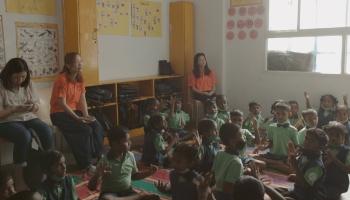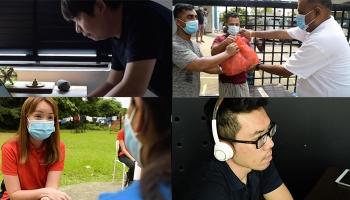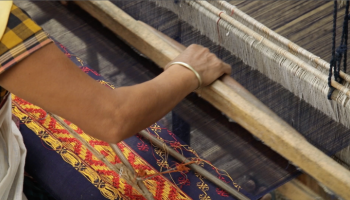Repurposing Fabric, Restoring Livelihoods
A flurry of activity is afoot; the whir of a sewing machine, the sharp snap of scissors slicing through fabric, and the soft drag of a chalk sliding across a surface. But no words are spoken. Mardiana Akhir (Mardi), one of the seamstresses, scribbles on a notepad and passes it to a petite lady next to her. Karen Teo looks at the notepad and scribbles something back. This back and forth carries on for a few minutes and smiles are exchanged.
As Mardi is deaf, Karen communicates with her either through text or writing on paper.
“I’m also learning sign language and I have even practised it with her,” beams Karen.
Karen is one of the founders of Re-store, with her daughter Claudia and her sister Veronica. It is a a social enterprise that focuses on upcycling unwanted fabric into products while employing individuals from marginalised communities.
“We realised that she [Mardi] has not been working for 14 years,” shares Karen.
“It did not stop us from hiring her, because we felt like there’s a lot of potential.”
44 year old Mardi moved to Singapore from Malaysia in 2004. She worked as a seamstress there but was unable to find a job in Singapore due to her being deaf. Mardi’s husband was the only breadwinner in the family and they struggled to make ends meet. In 2021, her daughter, Marisha Ng, chanced upon Re-store’s call for seamstresses on Instagram and realised that it was a perfect opportunity for her mother and their situation.
“I don’t want her to just be a housewife and not doing what she loves,” says Marisha. “I want her to feel happy outside and inside.”
Re-store currently employs 12 beneficiaries including Mardi. By allowing for flexible work arrangements; bringing work home, or doing part-time hours, Veronica and Karen want to create a community where women can feel safe and seek support from each other.
Veronica shares: “Most of the women who work with us tend to be very focused on providing for their family, and very often, they have very little time and energy for themselves to the extent that they neglect even their personal, mental and emotional well-being.”
The Re-store team treats Mardi and her daughter like family, bonding over meals and even helping them out with home matters.
One such way was when over lunch, Mardi shared her financial woes and Karen realised that Mardi was paying too much for her phone bill. Karen then called the servicer provider and helped to reduce her bill.
“This amount matters a great deal if you have to decide what you eat on a daily basis… This experience actually enabled Mardi to think about how she optimises spending her money,” says Karen.
Mardi signs: “Veronica and Karen support me in so many ways. We treat each other like sisters. We listen and help each other.”
Mardi has been with Re-store for about a year. Through understanding the process of repurposing discarded fabric into fashionable products like tote bags, pouches, hats and even pet accessories, Mardi and her daughter are more conscious of wastage.
“In the past, I used to discard things that I thought weren’t useful anymore,” signs Mardi. “After being at Re-store, I am surprised at how there are so many ways to repurpose waste.”
“Now, we don’t even buy new clothes. We thrift and repair our clothes.”
Marisha adds: “They (Re-store) actually see the potential in unwanted waste, like fabrics, and they make them into something beautiful… I think that’s beautiful actually, like trying to contribute to the world and also empowering women.”
Mardi’s newfound passion with Re-store has inspired Marisha in her choices as well.
Marsiah shares: “When there is a challenge, she actually doesn’t give up, she actually perseveres, and I think I should apply that in my future.”
“She actually inspires me about my own future because we can actually fulfil our passion. I should do what I love… So I want to be happy for myself as well.”
About Re-store
Contributors
Director
Karen Wai
Director, Camera & Editor
Paolo Ty
Producer & Writer
Executive Producer












